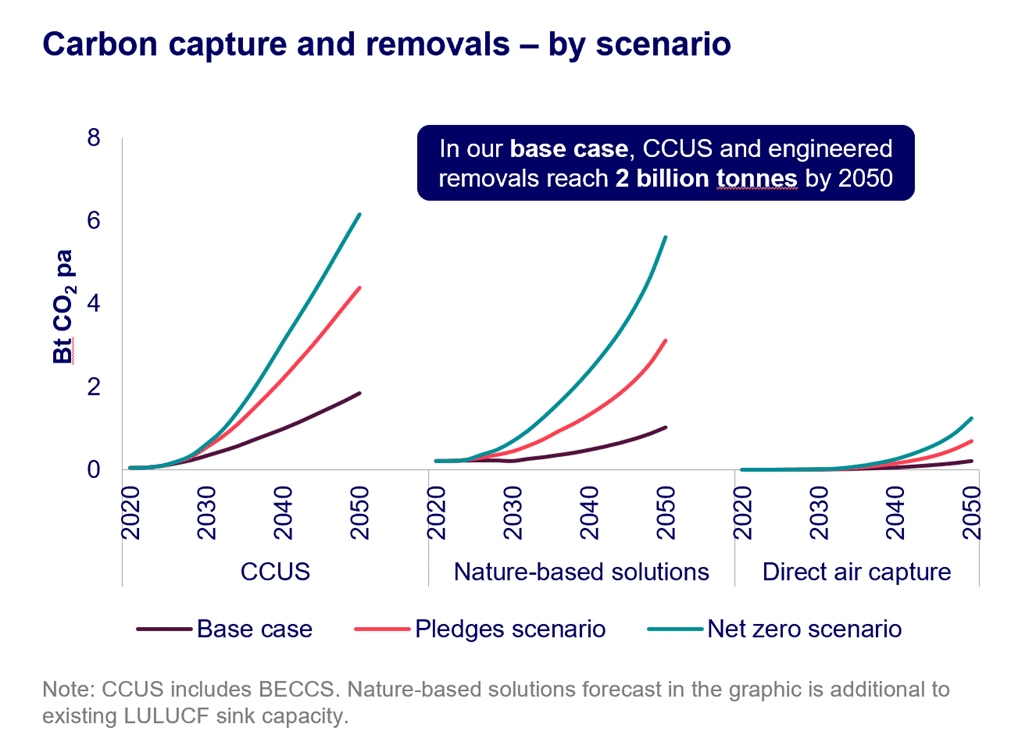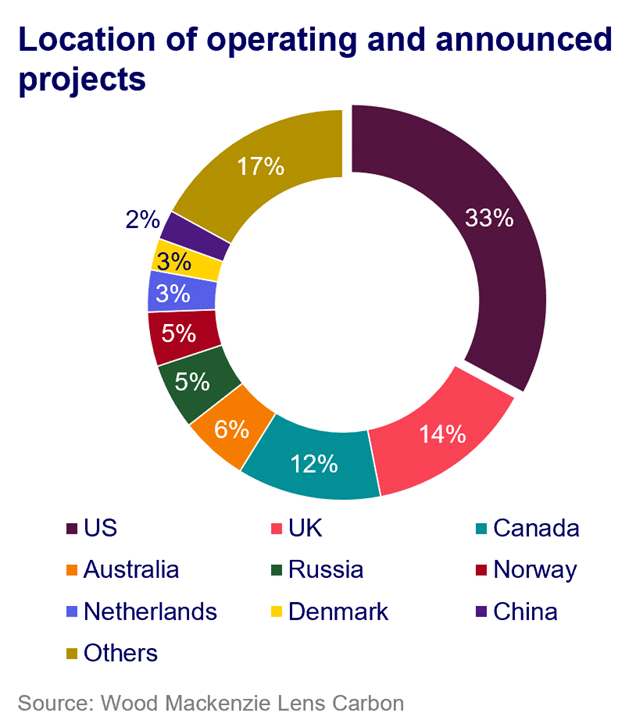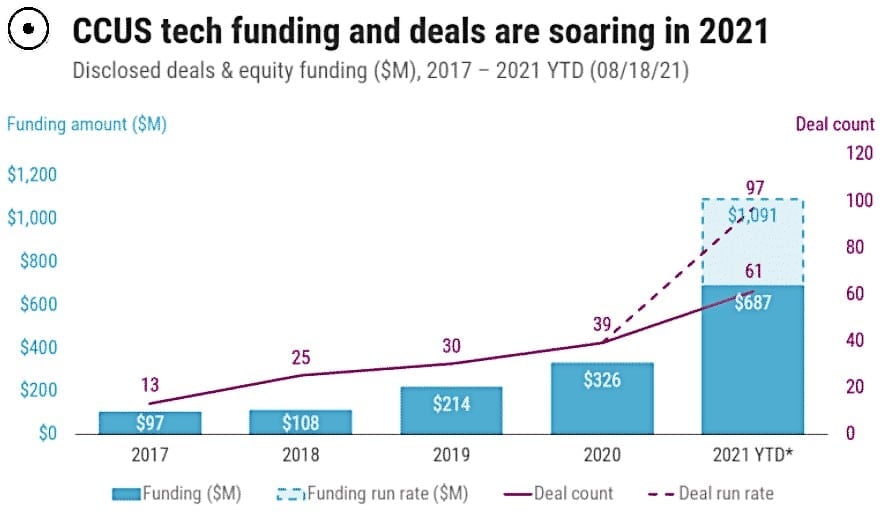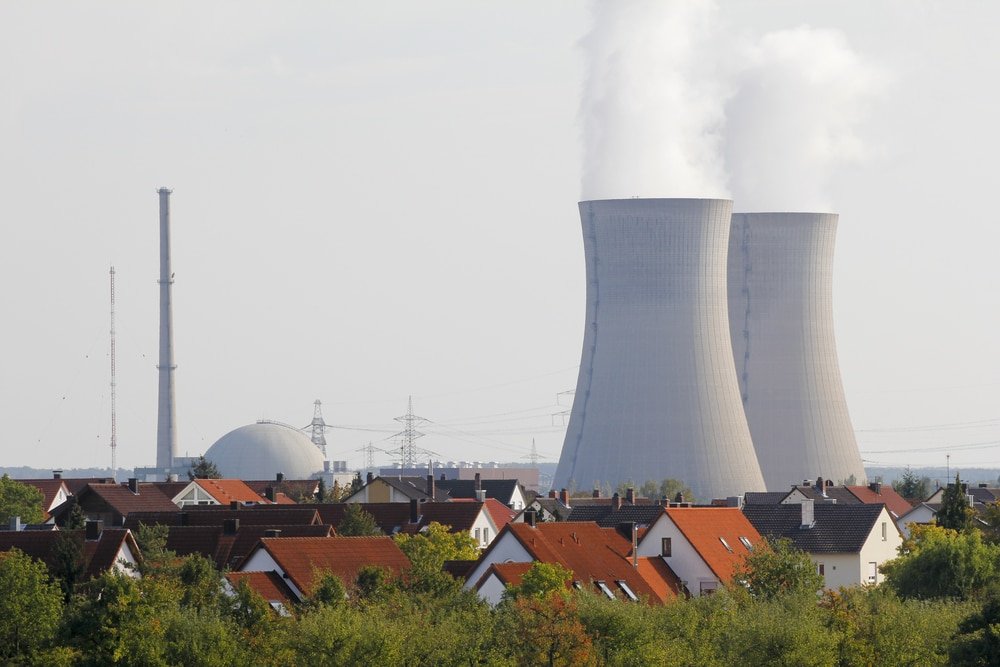To achieve global net zero goals by 2050, the world has to urgently fast track capturing 7 billion tonnes of carbon dioxide per year, according to Wood Mackenzie research.
According to their analysis, the current pace of carbon removal is on course to reach only 2 billion tonnes of CO2 by 2050 (base case scenario). This carbon capture capacity aligns with the 2.5°C global warming scenario.

Current and Planned Carbon Capture and Removal
Achieving the critical 1.5°C warming threshold requires 7 billion tonnes of carbon capture and removal by midcentury.
Speaking for Wood Mackenzie during their Carbon Capture, Utilization and Storage (CCUS) Conference, the research head Mhairidh Evans said that:
“We need a huge amount of carbon to be captured out of our industries and the power sector to decarbonise the last miles that can’t be easily reached by green electrification or alternatives… To come close [to 1.5°C], we need to get shovels in the ground quickly.”
Wood Mackenzie is currently monitoring planned global CCUS capacity at 1,400 million tonnes of CO2 per annum. This includes all kinds of projects: carbon capture, transportation, and storage, with the U.S. leading the way with 33%.
The UK comes second with 14% of the projects, followed by Canada with 12%, with the rest shown in the chart below.

Add to this the vast geological carbon storage resources available in the country for companies to tap. All these make the U.S. well-positioned for strong growth in the CCUS market.
Still, the analysis suggests that delaying actions or waiting for CCUS projects to become economically viable can make it more difficult to meet climate goals. This can further cause more economic implications due to the climate crisis.
Key CCUS Opportunities and Challenges
The United Nations’ IPCC and other renowned organizations believe that CCUS has a big role in avoiding carbon emissions that warm the atmosphere. The panel argues that capturing carbon and locking it away for good is key to achieving the Paris Agreement targets.
CCUS is one of the carbon removal technologies that’s getting the most attention from private and public investors in previous years.

To date, the U.S. Department of Energy has been investing billions of dollars in carbon capture projects. The agency is supporting both early-stage (R&D) and commercial carbon capture initiatives.
Additionally, with the new rules proposed by the Environmental Protection Agency, which regulate emissions from coal and new gas-fired facilities, CCUS technologies became an attractive solution for hard-to-decarbonize sectors.
Other governments are also keeping pace with the U.S. Canada, the UK, and the EU have also committed large sums of money to advance these climate technologies.
What Makes it Hard to Expand CCUS?
But the global research and consultancy firm highlighted some key challenges that hinder the industry to grow more and expand. These include nascent policy and regulations, unfit business models, and most particularly, high costs.
- Costs remain the biggest concern for businesses in the sector. Despite the 45Q tax credit, companies still have to wait for prices to go down to scale up their projects.
Furthermore, most technologies available today for carbon capture, transport and storage are still evolving. They have yet to demonstrate that they can deliver as promised. Majority are startups, needing large capital investments to develop and scale their carbon capture and removal technologies.
Some scientists and industry leaders even question the technology’s feasibility and efficacy. They claim that it detracts from the more urgent call to transition to renewables and other cleaner energy alternatives.
Add to this the challenge of convincing heavy polluters to embrace carbon capture as part of net zero strategies, as WoodMac noted. While there has been a growing number of carbon storage hub initiatives, there’s a limited demand from potential customers.
WoodMac expects project development costs to decrease by up to 30% during this decade. However, if companies wait for this price drop, that also means delaying the impact of their projects. In that case, the delayed carbon emission reductions will make the 1.5°C global warming dream far from reality.

